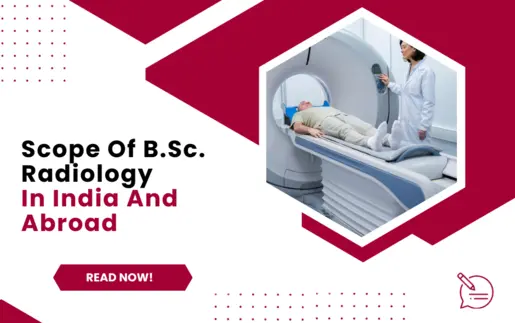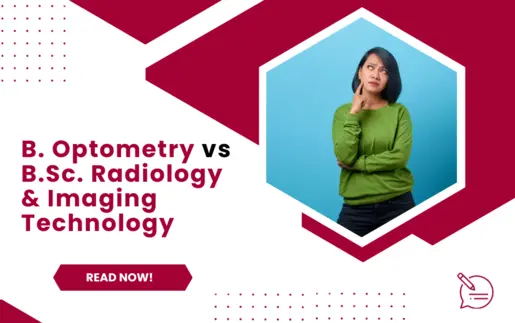Insightful Vision: Exploring the World of BSc Optometry
The discipline of BSc optometry offers in-depth instruction and medical understanding of the human eye. This course will clarify the principles of the human eye and teach students and practitioners of optometry how to operate various medical devices. The system is significant and career-oriented, giving applicants broad opportunities over three years.
Subjects like Geometrical Optics, Low Vision Aids, Contact Lenses, Clinical Psychology, and others are included in the BSc in Optometry syllabus. Students learn about optics and eye care in these courses. The technical or healthcare stream options are available to students.
Admission for the BSc in Optometry is based on merit and admission examinations. Most of India's top BSc in Optometry colleges need entrance tests. However, some also accept scores from Class 12 board exams. The cost of a BSc in optometry may vary from one B.Sc. Optometry colleges in Chandigarh to the next. However, it typically costs between INR 10,000 and INR 1 lakh.
BSc in Optometry: What is it?
A three-year, full-time undergraduate optometry program with six semesters of study is known as a BSc in optometry. Studying topics including general physiology, ocular physiology, hospital procedures, low vision aids, geometrical optics, nutrition, etc., is required for the BSc in Optometry degree. Candidates for the BSc in Optometry program must have completed the 10+2 or an equivalent Science stream test to be considered.
Graduates with a BSc in Optometry may work in fields such as contact lens and ophthalmic lens production, eye clinics, health consultancies, manufacturing facilities for lenses, optical stores, and multinational corporations that manufacture eye care goods. Jobs like optometrist, optician, sales executive, teacher, eye doctor, etc., are often given to them. Successful course graduates interested in further education may enrol in programs like M.Sc., Ph.D., and other research-focused programs in eye care science.
Why Should One Study BSc Optometry?
There are several benefits to pursuing a BSc in Optometry. Because of the benefits listed below, many students choose to enrol in BSc in Optometry courses:
After graduation, students may advance their knowledge of optometric procedures, clinical optometry contact lenses, pediatric optometry, and binocular vision eye illnesses and treatments by participating in regular fieldwork and receiving hands-on training.
The students will experience working with groups promoting road safety and participating in industrial safety initiatives. They may individually pursue their chosen field of expertise or work for public or private groups to further societal well-being.
The BSc in Optometry degree is the foundation for further education in the area, including the M.Sc., Ph.D., and M.Phil. Upon completion, a degree in Optometry entitles one to a position as a professor in any B.Sc. Optometry colleges in Mohali.
Optometric practices have a broad reach both domestically and overseas. It is an exciting and demanding job in which one may develop personally and get respect from others.
They may pursue further education in optometry and engage in research, after which they can work as lecturers and teachers at B.Sc. Optometry colleges in Chandigarh.
After the training, students may open their own eye clinic, optical store, lens production facility, etc., to start an independent practice.
Eligibility for a BSc in Optometry
Students who want to apply for admission to the BSc in Optometry program must meet the basic requirements listed below:
The applicants must have earned the minimum marks in their 10+2 diploma from an accredited educational board.
The minimum score needed for admission to BSc in Optometry programs varies according to the B.Sc. Optometry colleges in Punjab. However, students must get at least 50% in the PCB/PCM/PCMB categories.
Certain reputable B.Sc. Optometry colleges in Punjab also hold entrance exams for those seeking admission to the degree program in BSc in Optometry.
The final merit, or the total marks from the entrance test and the 10+2 final examinations, determines admission to B.Sc. Optometry colleges in Chandigarh.
On the first November of the admissions year, the applicants must have reached the age of 17. No upper age restriction applies.
What will be the future scope of a BSc in optometry?
With the help of this degree program, students may pursue a variety of optometry positions as well as develop their independent practices by opening their own eye clinic, optical store, lens production facility, etc. Several scopes are available in the industry nowadays for an optometry BSc graduate.
These specialists may work with ophthalmologists in hospital clinics, practice in optical settings, own optical businesses, or have fantastic employment prospects abroad.
Global corporations producing and distributing eyeglasses, contact lenses, and ophthalmic devices may provide clinical services. Graduates with a BSc in Optometry may also establish optical lens manufacturing businesses.
Finally, those interested in furthering their education may enroll in MSc and Ph.D. programs in the respective discipline and pursue a career in teaching.
Admissions Open at CGC Jhanjeri
Admissions open at CGC Jhanjeri for the BSc Optometry program. Chandigarh Group of Colleges Jhanjeri is one of the best B.Sc. Optometry colleges in Chandigarh. The college has state-of-the-art infrastructure and boosts quality education through its experienced faculty. The students can start their careers in hospitals, eye clinics, and contact lens clinics.
FAQs
What are my options after earning a BSc in optometry?
Whether you are interested in research, teaching, or just learning more theory, you should first consider pursuing a master’s in optometry, which is the best course of action after completing any bachelor's degree.
Second, the hospital where you are doing your internship may offer you a position immediately. The public health community, sports vision, behavioural optometrists, vision therapy clinics, contact lens practice, low vision clinics, diagnostics, NGOs, and blind schools are among the areas of employment in optometry.
You may complete a fellowship in a subject of interest, such as poor vision, contact lenses, or binocular vision treatment.
What are the objectives of a BSc in optometry, and what are the financial benefits?
Optometrists in India have many job alternatives available, so you may choose the one that best fits your preferences. You may get your B. Optometry and start your own independent optometry practice or work as a consultant optometrist. Whether you work for large corporations or have established your own independent clinic will affect your compensation plan.
How long does becoming an OD after earning a BSc in optometry take?
A bachelor's degree in optometry is a three-year program. However, consider seeking an OD degree before beginning your undergraduate studies. In that case, you may finish it in seven years and get your bachelor's degree in Vision Science before starting optometry school.
Is a BSc in Optometry Enough to Be an Eye Doctor?
A Bachelor of Optometry degree is just that; an optometry bachelor's degree. You need more time to practice optometry. It calls for a Ph.D. (O.D.). A doctorate, which is not a medical degree, enables one to refer to themselves as "Dr." OD, PhD, Pharm.D., and other doctorate degrees are examples of these degrees. An M.D. is required to work as an ophthalmologist, a physician who focuses on conditions and illnesses of the eyes.
Can I become a pure eye doctor after earning a BSC in optometry?
Optometrists aren't considered physicians in India. They are primary eye care experts who, instead of conducting operations and providing certain drugs, diagnose and treat patients with ocular illnesses by prescribing eyeglasses, contact lenses, low vision aids, vision therapy, etc. It would be best to pursue an MBBS and then an MS in Ophthalmology to become an ophthalmologist (eye doctor).



















